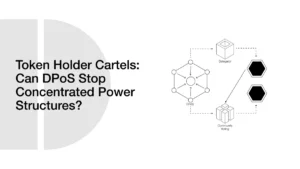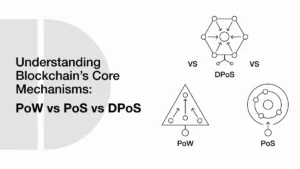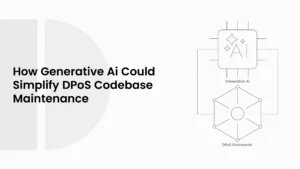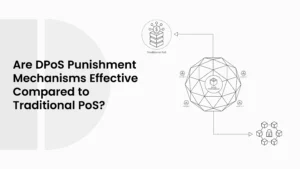Is DPoS Ready for AI-Generated Smart Contracts and Autonomous DAOs?
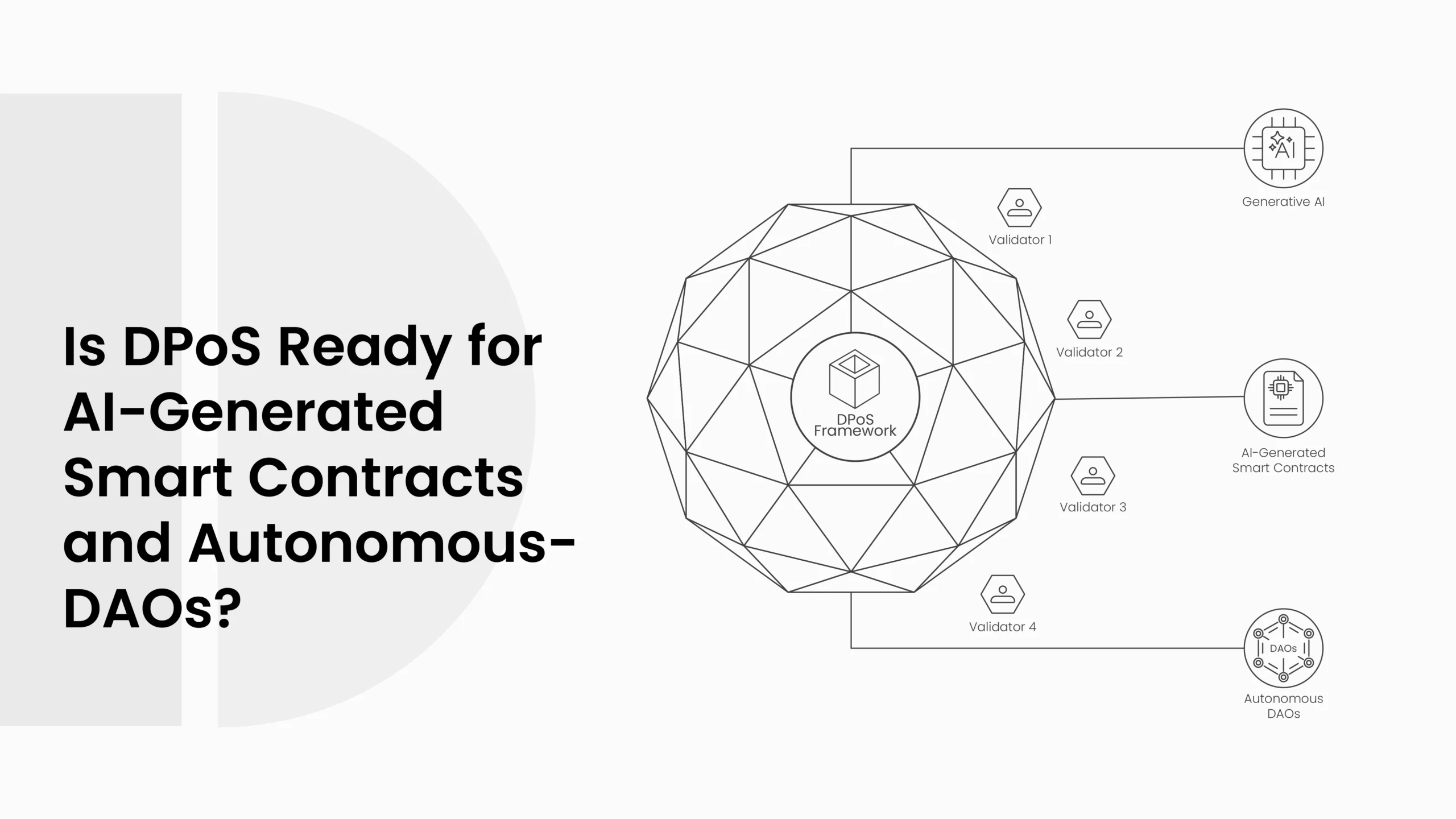
Blockchain is moving very fast. Every year, it feels like there is a new big idea. First, it was Bitcoin; then came Ethereum with smart contracts, followed by decentralized finance (DeFi), and now people discuss DAOs and AI. People are asking a new question today. Can Delegated Proof of Stake, or DPoS, support AI-generated smart contracts and even autonomous DAOs?
- What is Delegated Proof of Stake (DPoS)?
- Basics of DPoS
- Strengths of DPoS for Smart Contracts
- Current Limitations
- What are AI-Generated Smart Contracts?
- Meaning of Smart Contracts
- AI-Generated Smart Contracts
- Benefits of AI in Contract Development
- How Do DAOs Work Today?
- What is a DAO?
- Examples of DAOs
- Problems DAOs Face
- The Role of AI in DAOs
- AI as Assistants in Governance
- AI as Token Holders
- AI in Treasury and Core Contracts
- Is the World Ready for Autonomous DAOs?
- What is an Autonomous DAO?
- The Big Possibility
- The Big Risk
- Can DPoS Handle AI-Powered DAOs?
- Strengths of DPoS
- Weaknesses of DPoS
- DPoS + AI Future
- Real-World Research and Examples
- Aragon and AI DAOs
- Academic Perspective
- Risks of AI-Generated Smart Contracts on DPoS
- Technical Risks
- Ethical Risks
- Governance Risks
- The Future of AI DAOs and DPoS
- Short-Term Outlook
- Long-Term Outlook
- Final Question
- Conclusion
- Frequently Asked Questions About DPoS, AI Smart Contracts, and Autonomous DAOs
- What is Delegated Proof of Stake (DPoS)?
- What are AI-generated smart contracts?
- Can AI run a DAO?
- What is the risk of AI in DAOs?
- Is DPoS ready for autonomous DAOs?
- Glossary of Key Terms
This question is important because the future of blockchain is not only about money. It is also about governance and how decisions are made online. A DAO, or decentralized autonomous organization, is one way to manage groups of people and code together. Add artificial intelligence into this, and you get something much bigger. You get the idea of AI DAOs. These are DAOs where AI assists in creating rules, drafting contracts, or even managing the entire organization without human oversight.
DPoS is already known as one of the fastest consensus systems in blockchain. It enables token holders to vote for delegates who maintain the security of the chain. It is less heavy than Proof of Work and more efficient than many Proof of Stake systems. On the surface, it appears to be a good match for AI-driven systems.
Still, there are challenges. Smart contracts created by AI can be powerful but also risky. Autonomous DAOs can give efficiency, but can also take away human control. If it’s combined with DPoS, which already raises concerns about centralization and trust, everyone may face even bigger problems.
ALSO READ: How Generative AI Could Simplify DPoS Codebase Maintenance
What is Delegated Proof of Stake (DPoS)?
Basics of DPoS
Delegated Proof of Stake (DPoS) is a consensus mechanism that enables a blockchain to agree on transactions. In simple words, it is a consensus system. Instead of everyone competing to solve puzzles, as in Bitcoin, or everyone staking tokens, as in Proof of Stake, DPoS uses voting.
In DPoS, token holders select a small group of individuals or computers known as delegates. These delegates are responsible for confirming blocks and maintaining the network’s security. If a delegate does a bad job, the community can vote them out and replace them with someone else.
This makes DPoS very fast. Since only a few delegates are responsible for block creation, the network does not waste energy. It is also more democratic than some systems, because people get to pick who represents them in the process.
Strengths of DPoS for Smart Contracts
One of the big strengths of DPoS is its speed. Blocks are created quickly, often in just a few seconds. This speed is particularly useful when smart contracts are being used, as they often require quick confirmation of actions.
Another strength is governance. Since the system is built on voting, it already has a way for communities to make decisions. That makes it easier to connect with DAOs, which also depend on community voting and rules written in code.
DPoS also uses less energy compared to Proof of Work. That means it can scale better when thousands or even millions of contracts are running.
Current Limitations
But DPoS also has some weaknesses. One problem is centralization. Because only a small number of delegates are chosen, power can ultimately be concentrated in the hands of a few groups. If those delegates work together unfairly, they can control the chain.
Another challenge is participation. In many DPoS systems, not all token holders participate in voting. Sometimes, only a small number of individuals participate in the process. That reduces fairness and weakens decentralization.
For AI-powered DAOs or smart contracts, these issues could become bigger. If AI is creating contracts or making decisions, and only a few delegates are in charge, the balance of power might not be equal.
| Consensus Model | Speed | Energy Use | Governance Style | Best Use Case |
| Proof of Work | Slow | Very High | No voting system | Bitcoin |
| Proof of Stake | Medium | Medium | Token staking | Ethereum 2.0 |
| Delegated PoS | Fast | Low | Delegate voting | EOS, TRON |
What are AI-Generated Smart Contracts?
Meaning of Smart Contracts
A smart contract is a small program that runs on a blockchain. It is like an agreement written in code. Once the rules are written and placed on the blockchain, the contract runs autonomously. Nobody can stop it or change it unless the code allows it.
For example, if you want to sell a digital item, you can write a smart contract that says, “When someone sends me $10 in crypto, send them the item.” Once this contract is on the blockchain, it will do this automatically without needing a lawyer or a bank.
ALSO READ: How Green Bonds Could Be Managed Using DPoS Chains
AI-Generated Smart Contracts
Now imagine that instead of a person writing the code, an artificial intelligence system writes it. That is what it means by AI-generated smart contracts. AI can be trained to understand blockchain rules, identify security risks, and even write code more efficiently than most humans.
Some AI tools today can already write computer programs. They can also identify errors in the code and suggest corrections. If these tools are connected to blockchains, they can autonomously create and update smart contracts.
Benefits of AI in Contract Development
The biggest benefit of AI is speed. Humans may spend hours or even days writing a complex smart contract. An AI can write it in minutes.
Another benefit is fewer mistakes. Smart contracts are known to sometimes contain bugs, and these bugs can result in significant financial losses. AI can review and test the contract many times, which reduces the chances of errors.
AI can also lower costs. Many blockchain developers are in high demand and, therefore, expensive to hire. If AI can perform a significant portion of the work, the cost of building contracts decreases.
Finally, AI can make contracts more flexible. Humans may only think in one way, but AI can test thousands of scenarios and create contracts that fit more cases. This can be particularly useful for DAOs that need to manage multiple actions simultaneously.
| Feature | Human-Coded Contracts | AI-Generated Contracts |
| Speed | Slower, days or weeks | Much faster, minutes |
| Errors | More likely, human bugs | Reduced with AI testing |
| Cost | Higher, developers needed | Lower, less human effort |
| Flexibility | Limited by human skill | High, AI can test many scenarios |
How Do DAOs Work Today?
What is a DAO?
A DAO, short for Decentralized Autonomous Organization, is akin to an online company that is run by code and community votes, rather than traditional hierarchical leadership. It utilizes blockchain to record rules, decisions, and financial transactions. Members of a DAO hold tokens. These tokens give them voting power, just like shares in a company.
The goal of a DAO is to eliminate intermediaries and ensure decisions are made fairly and transparently. Everything happens on-chain, allowing it to be seen and verified by anyone.
Examples of DAOs
Some of the most famous DAOs today include MakerDAO, which manages a stablecoin called DAI. Another is Aragon, which builds tools for DAOs themselves. There is also BanklessDAO, a community focused on educating people about DeFi.
These DAOs are still managed by humans who write proposals, debate ideas, and cast votes. But the base idea is already working: a community runs the organization, not a single company leader.
Problems DAOs Face
Despite progress, DAOs still face challenges. Many proposals are lengthy and detailed. It can take a lot of time for members to read and understand them. As a result, not everyone votes, and participation rates can be low.
Also, governance can feel slow. If many proposals are pending votes, important changes may take weeks or even months to be implemented. This is a common issue in fast-moving markets, such as the cryptocurrency market.
Ultimately, DAOs still rely on humans to handle specific, tedious, or repetitive tasks. This is where AI can help.
The Role of AI in DAOs
AI as Assistants in Governance
AI can make DAOs more efficient by doing the smaller jobs that humans don’t want to do. For example, AI can read lengthy proposals and provide a concise summary. Instead of reading ten pages, a member can just see a two-minute summary. This makes it easier for people to stay active in voting.
AI can also help in moderation. In DAO forums or chats, AI can detect spam or harmful content. It can remove posts that don’t follow the rules, allowing moderators to focus on genuine discussions.
AI as Token Holders
AI agents could even hold tokens and vote on behalf of humans. For example, if a person trusts an AI program, they can give their tokens to it and let it vote automatically. This ensures that votes are always counted, even if the human is busy.
But this comes with risk. If too many token holders delegate their votes to AI, then humans may lose influence. AI could make most of the decisions, which might reduce fairness.
AI in Treasury and Core Contracts
AI can also work with the DAO treasury. It could automatically invest excess funds, manage risk, or block potentially hazardous proposals. For example, if a proposal tries to send money to a suspicious address, AI could flag it before funds are lost.
This makes AI a strong partner for DAOs. But it also makes DAOs more dependent on machines. If the AI makes a mistake or is compromised, the consequences could be severe.
| Role | Example Task | Benefit | Risk |
| Assistant | Summarize proposals | Saves time for members | May miss important details |
| Voter | Cast token votes | Increases participation | AI could dominate votes |
| Treasurer | Manage DAO funds and assets | Improves efficiency | Errors or hacks could lose money |
Is the World Ready for Autonomous DAOs?
What is an Autonomous DAO?
An autonomous DAO is a decentralized organization that operates largely autonomously, relying heavily on AI, rather than requiring human oversight at every step. In this case, the AI would write smart contracts, manage funds, make governance decisions, and even interact with other DAOs. Humans may only play a small role or even no role at all.
The idea is that once the code is live, the DAO can continue indefinitely. It doesn’t require a CEO, a manager, or a board meeting. The rules are established at the outset and then implemented by smart contracts and AI systems.
The Big Possibility
If DAOs become truly autonomous, they could transform the way the world perceives ownership. Imagine a fleet of self-driving cars owned by a DAO. The AI manages the cars, collects payments, pays for repairs, and even upgrades software. No company owns it. The DAO and its members own it.
This could expand into many fields. Healthcare DAOs, education DAOs, or even city governance DAOs. The efficiency could be high because AI does not get tired, does not take breaks, and does not play politics like humans sometimes do.
The Big Risk
The danger is also large. If an autonomous DAO is hacked or if the AI learns the wrong behavior, it could cause damage without humans being able to stop it. For example, if an AI decides to send all funds to one address, it may happen instantly.
There is also the problem of accountability. If AI is making all the choices, who do you blame when something goes wrong? No one can be fired. No one can be held responsible in court.
For these reasons, people are questioning whether the world is truly ready for AI DAOs. The excitement is real, but the risks cannot be ignored.
ALSO READ: What is the Role of Dynamic Inflation in Long-Term DPoS Stability?
Can DPoS Handle AI-Powered DAOs?
Strengths of DPoS
DPoS looks like a good fit for AI DAOs in some ways. Its biggest strength is speed. Since delegates are already chosen to produce blocks, transactions can be confirmed quickly. This helps AI systems that need real-time feedback to run smart contracts or manage treasuries.
Another strength is governance. DPoS is built on the principles of voting and delegation. That means it can naturally integrate AI voters or AI assistants in governance. The system already knows how to handle voting power.
Weaknesses of DPoS
But DPoS also has weak spots. One of the main problems is delegate collusion. If a few delegates control the chain, then adding AI on top might make it even easier for them to dominate.
Another issue is proof of humanity. If AI can vote as a token holder, how do people distinguish between humans and AI? Systems like WorldCoin or BrightID try to prove identity, but they are not perfect. In a DPoS system, if too many votes come from AI wallets, humans may lose control.
DPoS + AI Future
The most likely future is hybrid governance. Humans and AI will share control. AI will help with tasks like proposal reviews, quick votes, and treasury management. Humans will still decide on the big vision and values.
Some researchers also believe DPoS could be upgraded with AI audit layers. These AI systems could review contracts before they are deployed, assess proposals for risk, and hold delegates accountable. This would make DPoS safer for AI DAOs in the long run (Singh & Kim, 2019).
| Factor | DPoS Strength | Current Weakness | Needed Improvement |
| Speed | Very fast | None | Keep scaling as AI grows |
| Governance | A voting system exists | Risk of AI dominance in votes | Proof of humanity required |
| Security | Delegates monitor the chain | Smart contract hacks are possible | Add AI audit + stronger checks |
| Fairness | Community voting | Low participation sometimes | Incentives for more voters |
Real-World Research and Examples
Aragon and AI DAOs
One of the most active projects working on DAOs is Aragon. Aragon gives tools to build and manage DAOs on Ethereum and other chains. Recently, Aragon began exploring how AI can be integrated into DAO governance.
The idea is that AI can act as a connector between DAOs, or even serve as a decision-maker within them. Aragon’s new systems, such as Aragon OSx, allow for plugins that can be updated and swapped. This means that DAOs could one day integrate AI assistants to review proposals, manage treasuries, or vote on specific actions.
This shows that the shift toward AI DAOs is not just a theory. Projects are already experimenting with these ideas.
Academic Perspective
Researchers are also studying this. Madhusudan Singh and Shiho Kim (2019) wrote that DAOs are “scalable, self-organizing coordination on blockchain” where operations are automated with code (Singh & Kim, 2019). This aligns with the vision of AI DAOs, where automation extends even further by incorporating artificial intelligence into its core.
Ocean Protocol founder Trent McConaghy also wrote in 2016 that AI and DAOs together could be far more powerful than each one alone. In his words, “AI gets its missing link: resources; DAO gets its missing link: autonomous decision-making.”
Both practice and theory point to the same idea: DAOs and AI are slowly moving closer, and DPoS chains may play a role in that union.
Risks of AI-Generated Smart Contracts on DPoS
Technical Risks
The first risk comes from the code itself. Smart contracts are not perfect, even when written by AI. AI may create contracts faster, but it can still make mistakes. If there is a bug in the contract, money can be stolen or locked forever.
Additionally, AI systems themselves can be vulnerable to hacking. If a hacker tricks the AI, they could make it write contracts that benefit them. In a DPoS system where blocks are created quickly, such bad contracts might be executed before anyone notices.
Ethical Risks
Another risk is ethical. If AI is writing rules and managing money, who is in control? Humans might lose their voice. The AI could be programmed to favor some users or outcomes, not always in a fair way.
For example, imagine an AI that votes only for proposals that give more power to big token holders. Smaller members of the DAO would be left out. This breaks the spirit of decentralization.
Governance Risks
Finally, there are governance risks. DPoS already depends on a small group of delegates. If AI becomes a strong player, the power could concentrate even more.
There is also the question of identity. How is it proved that a voter is a real person and not just another AI agent with tokens? If AIs become the majority voters, DAOs might no longer be run by humans at all.
This risk is not only technical but also social in nature. DAOs are supposed to empower communities. If AI takes too much control, DAOs may cease to be communities and become automated systems with minimal human input.
The Future of AI DAOs and DPoS
Short-Term Outlook
In the near future, AI will likely work as a helper within DAOs, rather than as the full controller. It can make daily tasks easier, like reading proposals, testing contracts, or even reminding members to vote. DPoS is fast enough to handle these tasks, making it a suitable partner for AI support systems.
People may see hybrid DAOs where humans still set the goals, but AI handles execution. For example, the DAO votes on a strategy, and then AI makes small decisions inside that plan.
Long-Term Outlook
Looking further ahead, the picture becomes more dramatic. AI may own and run DAOs completely. In this case, the AI is not just helping humans—it becomes the DAO itself. It could own a treasury, manage its own rules, and provide services to humans in exchange for tokens.
This is both exciting and scary. On one side, it could make DAOs highly efficient. On the other hand, humans might lose control if the AI grows too strong.
Final Question
So the big question is: will this future be optimistic or dangerous? History shows that every new technology brings both growth and risk. With AI DAOs on DPoS, the balance will depend on how well governance, proof of humanity, and security are managed. If these elements are done right, DAOs could be fair, open, and very powerful. If they are handled poorly, there is a risk of creating systems that are impossible to stop or control.
ALSO READ: Can DPoS Solve High-Frequency Trading Bottlenecks on Blockchain?
Conclusion
Delegated Proof of Stake is one of the most promising systems for fast and scalable blockchain governance. It empowers communities to vote and enables the creation of blocks quickly. This makes it a good match for the growing world of smart contracts and DAOs.
When people incorporate artificial intelligence into the picture, the possibilities become even greater. AI can generate contracts, manage treasuries, and even act as token holders. It can make DAOs run more smoothly and efficiently. However, it also brings risks, including code errors, ethical problems, and the potential for humans to lose control.
So, is DPoS ready for AI-generated smart contracts and autonomous DAOs? The answer is partly yes, but not fully. It is ready to support AI as a helper and assistant. But it is not yet fully ready to handle AI as the complete manager of a DAO. Proof of humanity, stronger security, and better participation are still needed.
Ultimately, this is not just about technology. It is about trust, fairness, and the role humans want to play in the future of organizations. If done carefully, AI DAOs on DPoS could reshape how people work, vote, and create value together. If done too quickly, the risks may outweigh the rewards.
Frequently Asked Questions About DPoS, AI Smart Contracts, and Autonomous DAOs
What is Delegated Proof of Stake (DPoS)?
DPoS is a blockchain system where token holders vote for a small group of delegates who confirm transactions. It is faster and uses less energy than proof-of-work.
What are AI-generated smart contracts?
These are contracts written by artificial intelligence instead of humans. AI can write code faster, test it for bugs, and deploy it on a blockchain.
Can AI run a DAO?
Yes, in theory. AI can manage treasury funds, create proposals, and even vote. However, most DAOs currently rely on human intervention, and AI is primarily used as a supporting tool.
What is the risk of AI in DAOs?
The main risks are bugs in code, loss of human control, and unfair voting if too many AI systems act as token holders.
Is DPoS ready for autonomous DAOs?
Not yet. DPoS is fast and efficient, but it still needs stronger security, proof of humanity systems, and better participation from human voters before it can fully support autonomous AI DAOs.
Glossary of Key Terms
DAO (Decentralized Autonomous Organization): A blockchain-based organization run by code and community votes.
Smart Contract: A self-executing contract with rules written in code that runs on blockchain.
AI-Generated Smart Contract: A smart contract created or tested by artificial intelligence instead of a human developer.
DPoS (Delegated Proof of Stake): A consensus system where token holders vote for delegates to validate transactions.
Proof of Humanity: A method used to confirm that a blockchain user is a real person and not a bot or AI.

